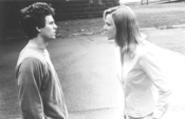Made on a tiny budget, Count is exhibit A for this year's defense of well-written, richly nuanced movies that value human behavior more than 30-car smashups, gratuitous sex, and all the other Hollywood evils presidential candidates like to moralize about. If you have an IQ above room temp, you may find this gem irresistible.
The principals include The Truman Show's Laura Linney as a wounded single mother, Sammy Prescott, who's trying to build a respectable life for herself and her eight-year-old son, Rudy, in sleepy Scottsville, and appealing newcomer Mark Ruffalo as Sammy's wayward brother, Terry, who comes home to visit with a résumé featuring odd jobs in a half-dozen states, a fistful of broken romances, and a stint in jail. Superficially they are opposites, Sammy and Terry. The tightly wound homebody seems to have nothing in common with the charming drifter, save a gene or two. But below the surface lies a far more complex and intriguing relationship, born of tragedy yet buoyed by wit.
For Lonergan, Count is an ideal opportunity to establish himself as a writer-director to be reckoned with. In concert with a terrific cast -- which also includes Matthew Broderick and Macaulay Culkin's amazing little brother, Rory -- he does just that. The family dynamics here are not just complicated; they are touchingly funny. Imagine the aimless Terry, forever drawn to vice, hauling his little nephew off to a bar in the middle of the night to play pool against the locals, for money -- and to strengthen the bond between man-child and child. Imagine the buttoned-up, churchgoing Sammy, partly liberated now by her wastrel brother's visit, igniting an impulsive affair with her geeky boss (Broderick) down at the local bank. Imagine a fatherless kid lucking out in ways neither he nor the audience can anticipate: From his mother he gets stability; from irresponsible Uncle Terry he gets some long-overdue joy.
The supposed grown-ups need a bit of that, too. As teenagers, they were numbed by their parents' deaths in a car accident, and we become present witness to the toll of that terrible hurt. Sammy has tried to take refuge in hearth and home, Terry in running away. But now that they are reunited in their dead parents' house, something has to give. Happily, Lonergan knows just what it is -- the emotional logjam that has imprisoned Sammy and Terry all these years. To his credit, this canny moviemaker doesn't inflict any easy answers (or happy endings) on his characters. Instead, he explores the constant messiness of life and the little victories it reluctantly yields.










